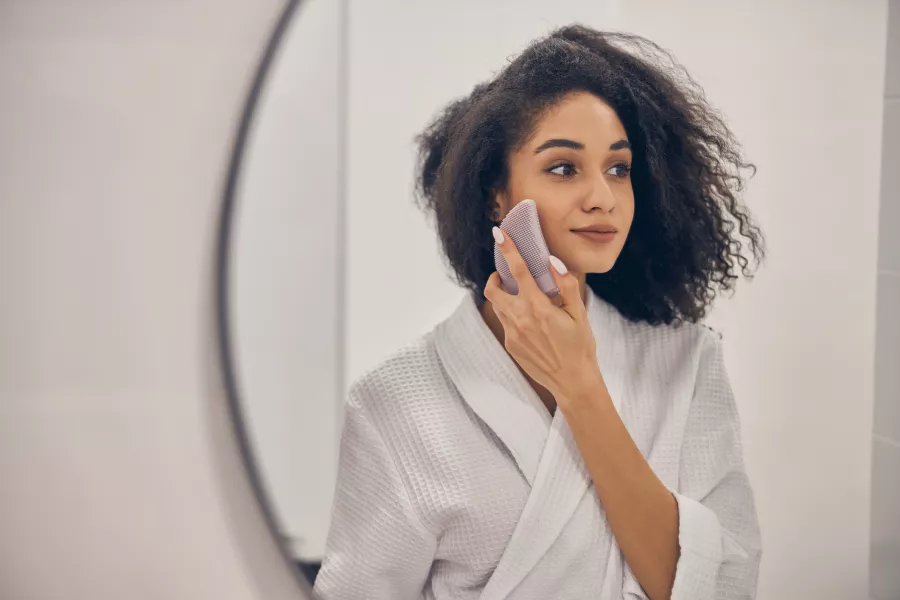This is the time of year many of us become keenly conscious of hyperpigmentation, because a tan can make these darker patches of skin appear more visible. Facialist and skin expert Fiona Brackenbury describes hyperpigmentation as the skin going into “fight or flight” mode whenever it is “perceiving a harmful attack”. This causes the skin to produce melanin, the pigment that gives hair and skin their natural colour, she explains.
Unfortunately, Brackenbury describes hyperpigmentation as one of the hardest things to treat, because there are so many factors to be considered and understood. If you’re suffering from these darker spots, there are two major things you can do to help: exfoliate and add certain ingredients into your skincare regime.

“Ensure you aid the elimination of dead skin cells and exfoliate regularly and effectively, using either hydroxy acids or retinoids – these will both also aid cell renewal,” advises Brackenbury.
Dr Howard Murad, dermatologist and founder of Murad Skincare, recommends adding ingredients like hexylresorcinol into your skincare routine, which “work to reduce excessive melanin production”. He also notes “ingredients like niacinamide can hold back the transfer of pigment to the surface, and reduce redness”.
To really get to the bottom of pigmentation, you need to understand what causes it…
The sun
Not only can the sun cause hyperpigmentation, but it can also make existing problems look more visible. This isn’t going to be new advice, but your best bet for protecting your skin is to limit sun exposure and be liberal with sunscreen.
“Sunscreen reduces the signals within the skin alerting the melanocyte cell (the cell producing the pigment) to produce melanin,” says Brackenbury. “The key is to ensure you reapply or use once-a-day formula, and even wear sunscreen in the house, as up to 80% of UVA rays penetrate through windows.”
Free radicals
Free radicals are often mentioned in skincare, but what are they? These are unstable atoms which can oxidise and damage your skin, speeding up the appearance of ageing. If you live in a city, they can be caused by pollution.
Free radicals can disrupt the skin’s barrier, “causing internal stress to the skin and hyperpigmentation”, Brackenbury says.
Vitamin C is an antioxidant which can fight free radicals, with Murad saying it brightens the skin and, as we can’t produce it naturally, it’s “an essential ingredient to look for”.
Stress
Last year I had really bad bouts of cystic acne & suffered from hyper pigmentation. This year, my skin is clear & flourishing thanks to a consistent skin care routine & less stress 🙏🏾 pic.twitter.com/KY2vS0FBal
— Who? MIKE JONEESSS (@Millie__Vanilli) June 25, 2020
Brackenbury refers to stress as the “invisible enemy” because it “causes inflammation in the skin, largely caused by a fragile, weakened skin barrier”.
Most of us are altogether too familiar with stress-induced breakouts, but how does it link to dark patches? “A compromised skin barrier will be more vulnerable to hyperpigmentation, as it will always be in defence mode,” Brackenbury explains. “Once the skin is in defence mode, there is no stopping the melanin from being produced.”
Acne scarring
“When the skin has suffered breakouts and blemishes over time, this can result in post-inflammatory hyperpigmentation,” explains Murad.
Hyperpigmentation affects all skin tones. It can range “from a blue-purple uneven tone on darker skin, to red-pink on Caucasian skin, but essentially it’s the same issue,” says Murad. “The frustration for patients, is that long after the acne has subsided, these colour changes give the appearance of acne, which can take time to heal.”
Murad recommends incorporating anti-inflammatory ingredients and exfoliators into your skincare routine to treat these patches.







